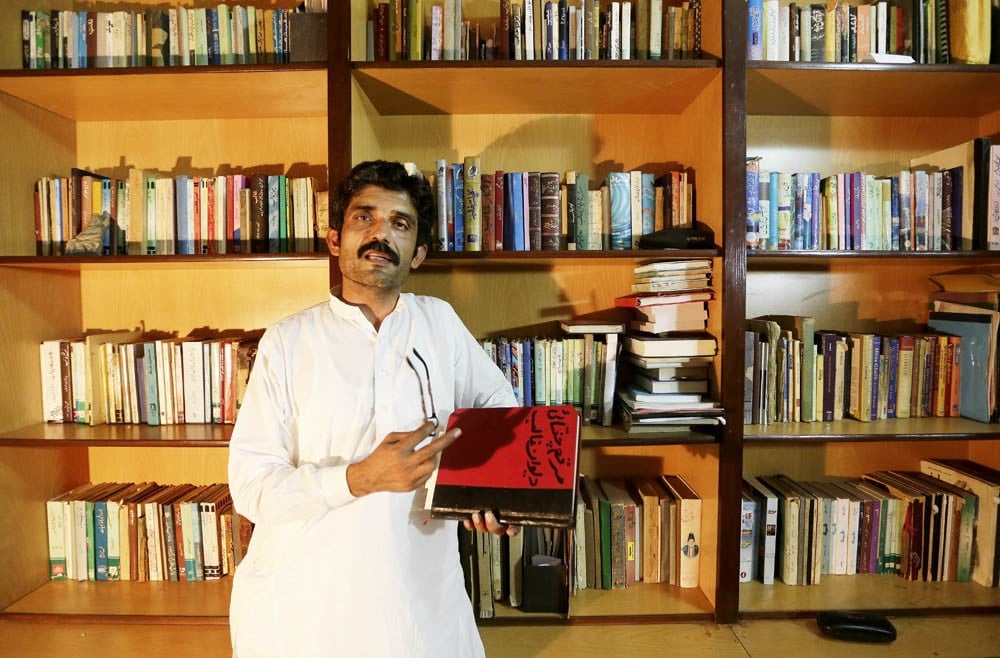
Asim Kalyar’s personal library is home to nearly 1,000 books on Ghalib. It’s been an expensive hobby but something that is very dear to him

Thirty-eight years old Asim Kalyar, a collector of books on Ghalib, says he was born to love the works of the great 18th century Urdu-Persian poet of the court.
At a very early age, he was exposed to the world of books in his ancestral home in Sargodha. "There were thousands of books in the library of my father [Fateh Muhammad Kalyar]," he says. His life has since revolved around two things -- farming and books.
Almost all the books in his father’s possession were in English language, the ones in Urdu were a countable few. Prominent among these was the monumental Naqsh-e-Chughtai, the Diwan-e-Ghalib which was accompanied by the images of paintings by the maestro Abdul Rehman Chughtai. Asim Kalyar recalls he was five when he touched this book for the first time, "Its richly illustrated tone completely overwhelmed me as a kid. That was my introduction to the magical world of Mirza Ghalib."
Years later, at Government College (now University), Lahore, Kalyar came into contact with Dr Moeenur Rehman, who was then chairman of the Urdu department and an expert on Ghalib. Rehman helped him understand the bard’s verses.
After obtaining Master’s degree in Urdu literature from the college, Kalyar went for his M.Phil. He briefly taught the subject at local institutions in Sargodha and Faisalabad before he took up a job in an advertising agency in Lahore. One ‘job’ that he says is closest to his heart and has kept him engaged for the past decade and half is collecting books on Ghalib. "It was sometime in the year 1999 when I first purchased a book on him," he reveals. "Since then I’ve simply splurged on books, magazines, and even tickets that have anything to do with Ghalib."
At age 38, Asim Kalyar is already in possession of "nearly one thousand books" on the great Urdu-Persian poet. Many of these books he says he purchased from old bookshops in Lahore and Islamabad. He’d grab anything -- biographies, criticisms on Ghalib, copies of manuscripts, and special numbers of literary journals such as ‘Auraq,’ ‘Funoon,’ ‘Naqoosh,’ ‘Adb-e-Lateef,’ and ‘Nigar’ -- that he comes across.
His collection is lovingly placed in his personal library at his residence in DHA, Lahore.
When I meet him for an interview, I am eager to know more about his prized collection, and also if anyone who shares his obsession with Ghalib can access his ‘library.’ What about research scholars? Would he let them enter his private space?
Kalyar says he owns "many rare books [on Ghalib]. Most of these are the first editions. For instance, Diwan-e-Ghalib (1863 edition, Agra); the German edition of Diwan composed by Dr Zakir Husain (1924 edition, Germany); and Muraqqa-e-Chughtai (1928 edition, Lahore)."
He has also got the first editions of S.M. Ikram and Ghulam Rasool Mehr which were published in 1939 and 1936 respectively.
And yes, he does allow his (former) students as well as research scholars to use his collection. Dozens of M.Phil and MA students from various educational institutions have visited his place so far.
Kalyar says that more than 90 per cent of these books are in Urdu; the rest are in Persian, Pashto, Sindhi, Balochi, and Bangla. "My friends in USA and UK have also helped me at times, when I needed a book that was published over there. For example, once I was looking for this book on Ghalib in English, compiled by Qurratulain Hyder and Ali Sardar Jafri, which one of my friends shipped me from the US."
He believes he must visit India, as it would benefit him in adding more diverse books to his collection. "But I don’t have the resources to plan such a visit."
Currently, Kalyar is in the process of cataloguing his collection. "This way it will become easier for everyone to browse through and access my collection."
Kalyar takes pride in the fact that he has managed such a large collection on Ghalib at a point in time when "there are more books available -- and written -- on Iqbal. But I don’t have any interest in Iqbal," he says candidly.
I ask him if he has read each and every book there is in his library, he says, "No, not all of them. Though, I know very well about the contents of all the books I have. Reading is my favourite pastime."
So, which books on Ghalib are his best loved? Kalyar says Ghalib Daroon-e-Khana by Indian scholar Kalidas Gupta Riza, and Ghalib Nama by Maalik Ram, another renowned Urdu, Persian and Arabic scholar from India.
Does he intend to write one himself? "My priority right now is to complete the indexing of my entire collection. Later, I may consider writing a book on Ghalib," he replies.